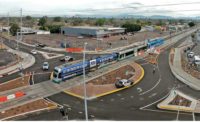At several dozen college campuses, airports and residential communities, low-slung, driverless shuttle buses cruise around predefined routes. These low-speed vehicles typically carry up to 15 passengers. EasyMile, a French firm, is one of the largest operators, with deployments in over 25 countries. It entered the U.S. market in 2017. “EasyMile currently has driverless shuttles operating in Virginia, Michigan, Utah, California, Colorado, New Jersey, North Carolina and Texas,” says Lauren Isaac, director of business initiatives in the U.S. “Our shuttles are not only intelligent but also eco-friendly, as they are fully electric and zero emission.”
One of EasyMile’s deployments was a six-month demonstration project in 2019 for Denver’s Regional Transportation District, a mile-long loop at a train station. “This was the first deployment of an autonomous vehicle operating in mixed traffic on a public roadway in the city and county of Denver and in the state of Colorado,” says M. Marta Sipeki, RTD senior manager, public relations and engagement. “This was also one of the first deployments nationally of an AV operating on a public roadway and integrated with a transit agency’s service. There were no accidents involving the AV. It is very quick to respond to obstacles, in fact, faster than a human operator.”
|
Related Article |
Optimus Ride Inc., a startup out of MIT, has shuttles operating in geo-fenced areas at Halley Rise, a mixed-use community in Reston, Va.; the Brooklyn Navy Yard; Paradise Valley Estates in California; and the Boston Seaport. The firm partners with developers of business parks and mixed-use communities. “We believe the first autonomous vehicles that will generate profits and make business sense will appear in these environments because you can build the tech much more quickly,” says Ryan Chin, CEO and co-founder of Optimus Ride.
In Florida, two autonomous shuttles manufactured by French firm Navya and operated by Beep make 1.2-mile-long circuits through Lake Nona, a planned community in Orlando. “The shuttle companies are trying to have a platform to test their products, to see how well their vehicles and software operate in the real world,” says Paul Lewis, vice president of policy at the Eno Center for Transportation.




